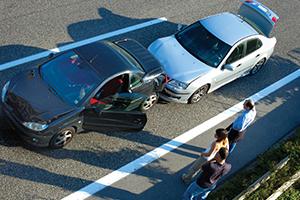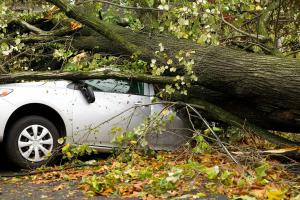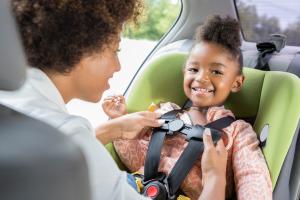Keep summer travels safe

Simple preparations can help protect you and your vehicle when you’re traveling.
Summer is a great time to take a vacation or weekend trip, which means many cars, campers, motorcycles and motor homes are on the roads, with increased potential for a problem or accident to occur.
As you plan your travels, there are a few things to check off your list to make your trip safer:
- Be ready for the road. Inspect the tires on cars and boat trailers to make sure there is plenty of tread and they are properly inflated. Have a certified mechanic check the engine, hoses, belts, batteries, windshield, windows and fluid levels. And, be sure to pack basic emergency equipment, including jumper cables, a car jack, a flashlight and a first-aid kit.
- Pack the vehicle carefully. Make sure luggage is properly stowed, as sudden stops can turn unsecured items into dangerous projectiles. Leave enough space so the driver can safely see out the windows and rear view mirrors. Leave at least a four-inch gap between your storage and windows to avoid glass damage.
- Buckle up. Make sure everyone in the vehicle, including the driver, uses a seatbelt. Infants and toddlers should be secured in approved, properly installed, size-appropriate car seats. The back seat is the safest place to be for children ages 12 and under.
- Focus on the road. Program your GPS before hitting the road. Avoid using a cell phone while driving. Even hands-free phones can be a distraction. If using a phone is a must, have a passenger handle it or pull off the road in a safe place and turn on the hazard lights. On long drives, share the driving with another passenger if possible, to avoid getting too tired.
- Be prepared for sun and heat. When driving on a sunny day, try to wear sunglasses to minimize eye strain and obstructions of vision from the brightness. To prevent heat related-injury, never leave a child or a pet unattended inside a car.
- Check your insurance coverage. Depending on travel plans, some additional protection may be a good idea. Talk with your local independent insurance agent to make sure your auto insurance policy provides adequate coverage for vehicle property damage and bodily injury. A boat or camper should also be insured, both on and off the water and road. Consider adding a roadside assistance plan and trip interruption insurance, in case a vehicle breaks down or is involved in an accident.
Sources
National Highway Traffic Safety Administration
Related resources
Keep summer travels safe
Simple preparations can help protect you and your vehicle when you’re traveling.
Summer is a great time to take a vacation or weekend trip, which means many cars, campers, motorcycles and motor homes are on the roads, with increased potential for a problem or accident to occur.
As you plan your travels, there are a few things to check off your list to make your trip safer:
- Be ready for the road. Inspect the tires on cars and boat trailers to make sure there is plenty of tread and they are properly inflated. Have a certified mechanic check the engine, hoses, belts, batteries, windshield, windows and fluid levels. And, be sure to pack basic emergency equipment, including jumper cables, a car jack, a flashlight and a first-aid kit.
- Pack the vehicle carefully. Make sure luggage is properly stowed, as sudden stops can turn unsecured items into dangerous projectiles. Leave enough space so the driver can safely see out the windows and rear view mirrors. Leave at least a four-inch gap between your storage and windows to avoid glass damage.
- Buckle up. Make sure everyone in the vehicle, including the driver, uses a seatbelt. Infants and toddlers should be secured in approved, properly installed, size-appropriate car seats. The back seat is the safest place to be for children ages 12 and under.
- Focus on the road. Program your GPS before hitting the road. Avoid using a cell phone while driving. Even hands-free phones can be a distraction. If using a phone is a must, have a passenger handle it or pull off the road in a safe place and turn on the hazard lights. On long drives, share the driving with another passenger if possible, to avoid getting too tired.
- Be prepared for sun and heat. When driving on a sunny day, try to wear sunglasses to minimize eye strain and obstructions of vision from the brightness. To prevent heat related-injury, never leave a child or a pet unattended inside a car.
- Check your insurance coverage. Depending on travel plans, some additional protection may be a good idea. Talk with your local independent insurance agent to make sure your auto insurance policy provides adequate coverage for vehicle property damage and bodily injury. A boat or camper should also be insured, both on and off the water and road. Consider adding a roadside assistance plan and trip interruption insurance, in case a vehicle breaks down or is involved in an accident.
Sources
National Highway Traffic Safety Administration
Related resources
Keep summer travels safe
Simple preparations can help protect you and your vehicle when you’re traveling.
Summer is a great time to take a vacation or weekend trip, which means many cars, campers, motorcycles and motor homes are on the roads, with increased potential for a problem or accident to occur.
As you plan your travels, there are a few things to check off your list to make your trip safer:
- Be ready for the road. Inspect the tires on cars and boat trailers to make sure there is plenty of tread and they are properly inflated. Have a certified mechanic check the engine, hoses, belts, batteries, windshield, windows and fluid levels. And, be sure to pack basic emergency equipment, including jumper cables, a car jack, a flashlight and a first-aid kit.
- Pack the vehicle carefully. Make sure luggage is properly stowed, as sudden stops can turn unsecured items into dangerous projectiles. Leave enough space so the driver can safely see out the windows and rear view mirrors. Leave at least a four-inch gap between your storage and windows to avoid glass damage.
- Buckle up. Make sure everyone in the vehicle, including the driver, uses a seatbelt. Infants and toddlers should be secured in approved, properly installed, size-appropriate car seats. The back seat is the safest place to be for children ages 12 and under.
- Focus on the road. Program your GPS before hitting the road. Avoid using a cell phone while driving. Even hands-free phones can be a distraction. If using a phone is a must, have a passenger handle it or pull off the road in a safe place and turn on the hazard lights. On long drives, share the driving with another passenger if possible, to avoid getting too tired.
- Be prepared for sun and heat. When driving on a sunny day, try to wear sunglasses to minimize eye strain and obstructions of vision from the brightness. To prevent heat related-injury, never leave a child or a pet unattended inside a car.
- Check your insurance coverage. Depending on travel plans, some additional protection may be a good idea. Talk with your local independent insurance agent to make sure your auto insurance policy provides adequate coverage for vehicle property damage and bodily injury. A boat or camper should also be insured, both on and off the water and road. Consider adding a roadside assistance plan and trip interruption insurance, in case a vehicle breaks down or is involved in an accident.
Sources
National Highway Traffic Safety Administration
Related resources
Keep summer travels safe
Simple preparations can help protect you and your vehicle when you’re traveling.
Summer is a great time to take a vacation or weekend trip, which means many cars, campers, motorcycles and motor homes are on the roads, with increased potential for a problem or accident to occur.
As you plan your travels, there are a few things to check off your list to make your trip safer:
- Be ready for the road. Inspect the tires on cars and boat trailers to make sure there is plenty of tread and they are properly inflated. Have a certified mechanic check the engine, hoses, belts, batteries, windshield, windows and fluid levels. And, be sure to pack basic emergency equipment, including jumper cables, a car jack, a flashlight and a first-aid kit.
- Pack the vehicle carefully. Make sure luggage is properly stowed, as sudden stops can turn unsecured items into dangerous projectiles. Leave enough space so the driver can safely see out the windows and rear view mirrors. Leave at least a four-inch gap between your storage and windows to avoid glass damage.
- Buckle up. Make sure everyone in the vehicle, including the driver, uses a seatbelt. Infants and toddlers should be secured in approved, properly installed, size-appropriate car seats. The back seat is the safest place to be for children ages 12 and under.
- Focus on the road. Program your GPS before hitting the road. Avoid using a cell phone while driving. Even hands-free phones can be a distraction. If using a phone is a must, have a passenger handle it or pull off the road in a safe place and turn on the hazard lights. On long drives, share the driving with another passenger if possible, to avoid getting too tired.
- Be prepared for sun and heat. When driving on a sunny day, try to wear sunglasses to minimize eye strain and obstructions of vision from the brightness. To prevent heat related-injury, never leave a child or a pet unattended inside a car.
- Check your insurance coverage. Depending on travel plans, some additional protection may be a good idea. Talk with your local independent insurance agent to make sure your auto insurance policy provides adequate coverage for vehicle property damage and bodily injury. A boat or camper should also be insured, both on and off the water and road. Consider adding a roadside assistance plan and trip interruption insurance, in case a vehicle breaks down or is involved in an accident.
Sources
National Highway Traffic Safety Administration





